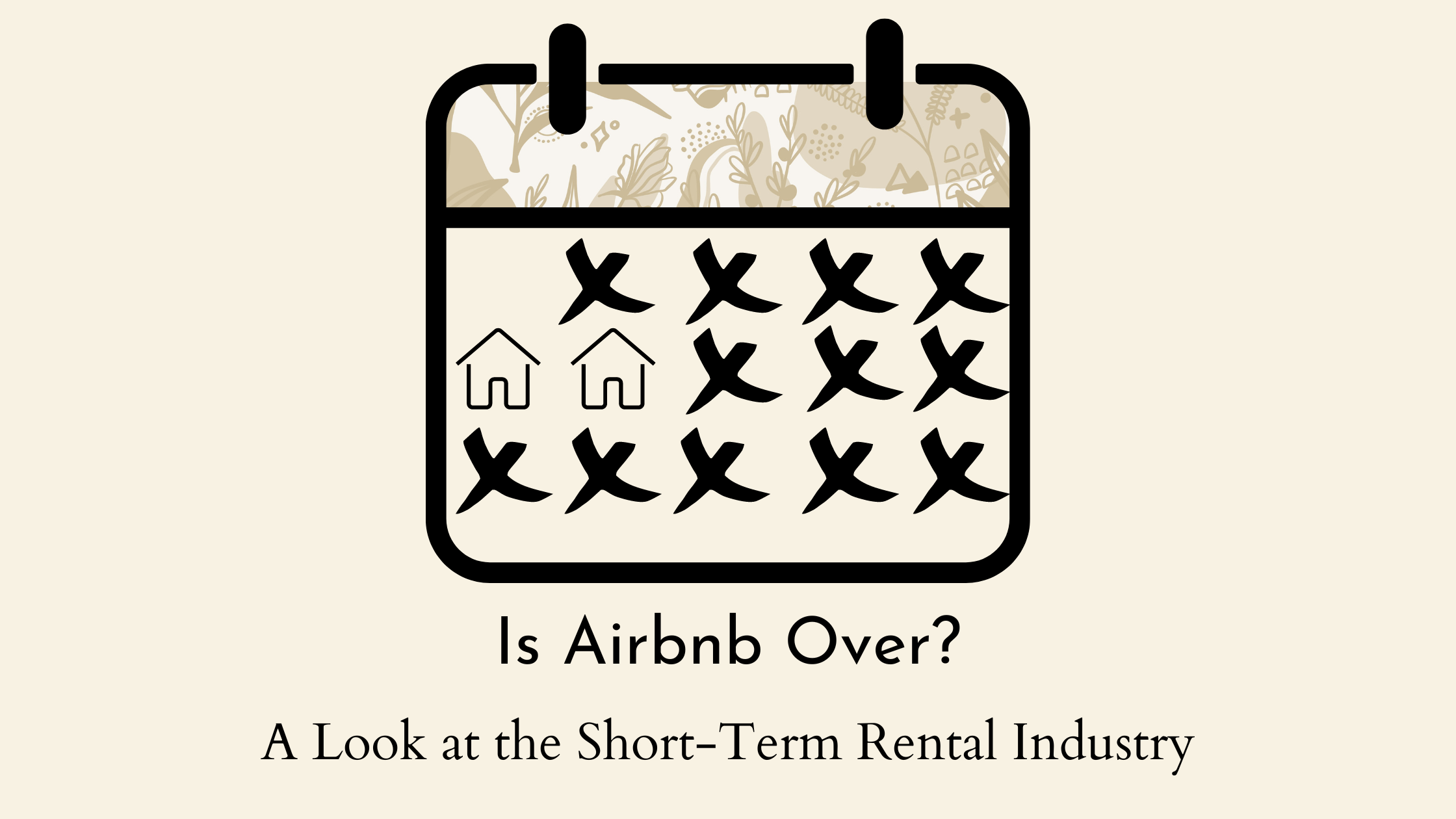
The short-term rental: a furnished and self-contained housing unit rented for a short period (less than 30 days), has exploded in popularity in recent years; even the pandemic couldn’t slow its growth. However, recently, the topic of the sustainability and longevity of this industry has emerged. In fact, a hashtag about the phenomenon has been created – #Airbnbust.
The company most synonymous with short-term rentals is Airbnb. A site where homeowners can put a property online to rent on a short-term basis, even just a night. Originally started as a way to make rent in the expensive San Francisco, the founders of Airbnb originally coined it AirBed & Breakfast, charging $80 for an air bed on their floor to those in town for a convention who couldn’t book a hotel. From there, they had ups and downs with the company, at one point selling election-campaign-themed cereal boxes to fund their start-up. However, in 2009, after entering the New York market and gaining funding, the site took off. In fact, not many will call a short-term rental an Airbnb, even if it’s not listed there. But, recently people have begun to wonder, is Airbnb and the short-term rental market going bust? And if yes, then why?
OVERSUPPLY?
Due to the popularity of Airbnb, VRBO, and other short-term rental sites, many saw them as the next big thing to invest in. This has led to some cities having numerous listings, usually in the same area. The pandemic played a role in this, as bookings increased by about 21% in 2021 and another 21% in 2022. These high rates of bookings, coupled with low mortgage rates, resulted in many purchasing additional properties specifically for short-term rentals, with a 19% increase in listings from 2021 to 2022. However, with all the new listings, a reduction in the travel frenzy, and high inflation rates – there has been a correction.
This oversupply has especially been evident in cities with no short-term rentals regulations. The cities that do have rules and a cap on short-term rentals have not had the oversupply issue, as much. This has led to a continued steady profit for short-term rental owners there, due to less competition. On the flip side, cities with limited regulations on short-term rentals opened up an opportunity for investors that many took advantage of. This large pool of listings, is good for the travelers and no so good for the hosts whose listing are not selected.
Is Oversupply an Issue? Yes, in many places there are too many listings, creating a highly competitive market for hosts
GOVERNMENT REGULATIONS?
In terms of government, changes are happening there that are affecting short-term rentals. For example:
— A bill was just passed in Indiana that now lets local government units charge an annual $25 inspection fee.
— In New York City, hosts must be present at the site if a guest’s stay is less than 30 days
— In San Francisco, short-term rentals must be the host’s primary residence for at least 275 nights a year
— Laguna Hill recently banned all short-term rentals as of May 26th, 2023
Wisconsin is considered one of the more friendlier states towards short-term rentals; however, that doesn’t mean certain areas haven’t devised regulations or even outright placed bans on short-term rentals.
Recently, there has been a shift in many communities, whether they desire to keep a community culture, keep neighborhood prices down (for both rentals & purchased properties), reduce the potential for noise, or simply have a personal ideology to push their local municipalities to put a stop to or make new rules for hosts.
Even if it is not an outright ban on short-term rentals, some of the new rules mean that a host can no longer make a short-term rental feasible, leading to a sale or transition into a longer-term rental. If more municipalities begin to enact short-term regulations, there could be a drop in listings, which may correct some of the oversupply; however, too many regulations may dry up the availability altogether, with hosts having to become long-term landlords or sell out.
Are Governmental Regulations an Issue? They can be, especially as more neighbors are calling for regulations or outright bans.
DEMAND?
Despite what social media would have you believe, the demand for short-term rentals is not slowing down. In fact, it keeps going up; in April, it was reported at 10% higher than in 2022, and the booked summer revenue was 14.5% higher.
This heightened demand is certainly noticeable in the southern states and large urban cities and also vacations abroad, to European getaways.
Although many post on social media that they are over the short-term rental market due to rising fees and hosts rules for their properties, the numbers don’t appear to reflect that. So, people are simply venting on social media and then still booking, or the amount of people who have sworn off Airbnb is so small that it isn’t going to have a noticeable impact on demand.
Is Demand an Issue? No, people are still booking short-term rentals, no matter what social media states.
SO WHAT’S GOING ON?
The truth is, the #Airbnbust is largely social media overhyping something; short-term rentals have carved a place out in the rental market and are likely here to stay. Although there may be some oversupply and negligible fluctuating demand, more is needed to rock the industry. Currently, the two major threats to it are governmental bodies imposing restrictions and hotels entering the space.
Governmental bodies are hearing from neighbors who are unhappy with the short-term rentals and taking steps to alleviate these concerns. It’s a discussion that pits host against neighbor and is happening around the country. Governments will need to balance both sides, with community members concerns and the money/tourism that these short-term rentals provide.
Meanwhile, hotels have taken notice of the lure of short-term rentals and have begun to venture into this space. Hotels have the added benefit of commercial laundry, cleaning staff, and on-site concierge service. These three aspects can be shortcomings for the small family-run short-term rental and give the hotels an advantage. This is alongside the fact that they have more power with governmental bodies and are not often in residential areas.
HOW WILL THE SHORT-TERM RENTAL HOST MAKE IT?
Although short-term rentals are not “over”, hosts will need to make changes to survive this changing short-term rental industry. These will include things like:
— Introducing more sustainability to appeal to the environmentally conscious renter
— Differentiating with design or hobby offering
— Appeal to a certain kind of traveler (some have begun to market specifically to Bachelorette Parties)
— Offering more services or a unique offering to renters
— Improving upon their use of technology and data to make decisions and communicate with travelers
— Participating in local events and building a brand in the community
— Working with governmental bodies and neighbors to devise regulations that do not threaten their business
Short-term rentals are far from over, and parties still have the potential to enter the industry; it will just take more thought and work than listing the property online to turn a profit.

